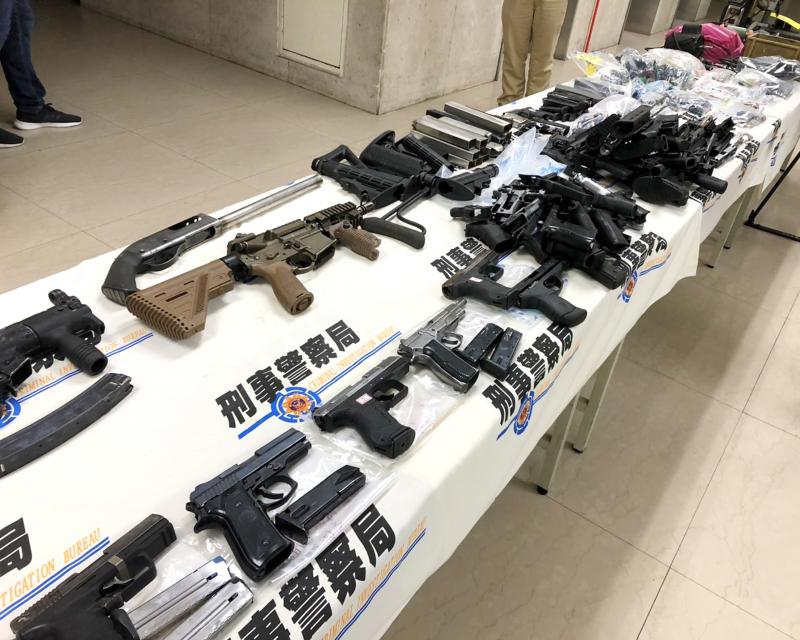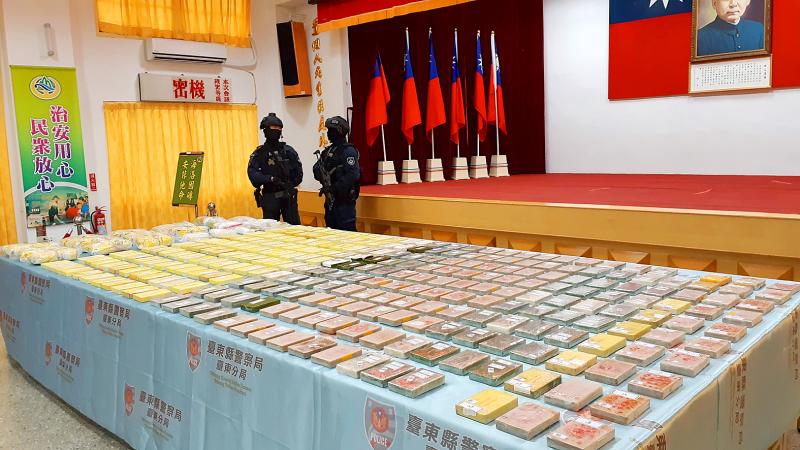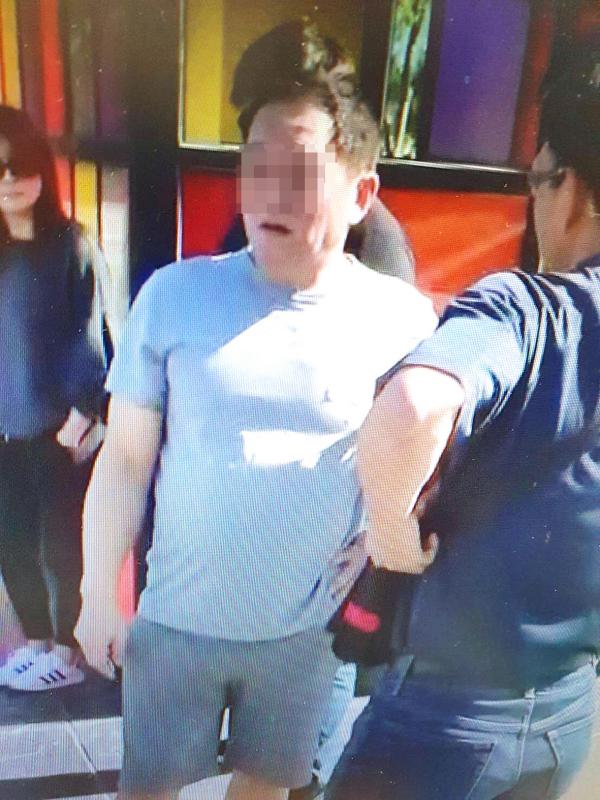Longtime Taiwan-based political commentator J. Michael Cole pointed out this week in the Global Taiwan Brief that a real and serious threat to Taiwan is the potential that its current “gray zone” tactics could be carried further via Chinese Communist Party (CCP) sponsorship of “substate actors” in Taiwan to carry out assassinations and foment social unrest.
Cole instances Russia’s intervention in Ukraine using substate actors. Cole observes that many Taiwan organized crime gangs, including the largest and most pervasive, are pro-China and have long practiced the art of funneling weapons and funds through their networks in Asia. They would make ideal agents for substate actions against Taiwan. Indeed, according to Cole, they already have.
CCP EXPLOITATION

Photo: Chiu Chun-fu, Taipei Times
Use of substate actors is an old strategy, dating back to the Greeks. Recent examples abound, from Nazi German use of the Sudeten German Party in Czechoslovakia to the CIA-fostered Bay of Pigs invasion. Taiwan, sadly, has an abundance of groups that could be exploited by the CCP.
Consider the kind of networks operated by someone like Lin Hsiao-tao (林孝道), the drug kingpin based in Pingtung, who at one time was allegedly the source for roughly a third of the drugs in Taiwan. Lin had a network that stretched from the Shan State of Myanmar across Asia to Japan, South Korea, the Philippines and Indonesia. Among his numerous assets was a flotilla of large fishing vessels registered through third parties in Panama, or in places like Bolivia. He used the boats to transport drugs, staffed them with soldiers hired from the rebels in Mindanao, and spent lavishly on small arms, including rocket artillery. Equipped with desalination systems, his largest ship would stay at sea 300 days a year.
Drug networks like Lin’s are hardly the only gray and black links that operate between China and Taiwan. The underground banking system is of course legendary. Less well known are the complex networks for smuggling art objects out of China and into Taiwan that have operated for decades. In the 1990s, for example, one method of smuggling involved wrapping the object in waterproof plastic and attaching an electronic signaling device to it. Fishing boats would arrive off Taiwan from China, dump the smuggled objects in the water just outside a port, and local contacts would track them with the signal and recover the smuggled object. Such networks could easily be re-purposed.

Photo: Huang Ming-tang, Taipei Times
Alongside covert links, there are numerous networks, such as religious, cultural and business associations, that operate right out in the open, have strong links to China and advocate pro-China political and economic positions. There are even formal political parties in Taiwan that are strongly pro-China.
It is not difficult to imagine what kind of uses such networks could be put to if China wanted to make trouble in Taiwan.
Ukraine also suggests another problem that Taiwan will encounter: China not stopping the pressure when independence is achieved. We already have historical examples of that from recent CCP history in the invasions of East Turkestan and Tibet.

Photo: Chiu Chun-fu, Taipei Times
Nations do not easily let go of claimed or once-ruled territories and often continue to interfere in their economic and political life. All along its borders — not merely in Ukraine — Russia continues to make trouble in its former imperial territories. This is also a problem for former colonies. The Philippines has struggled for decades with US dominance of its economy and politics. The UK maintains its Commonwealth, while several of France’s former colonies in Africa still use the CFA Franc — the currency used in many French-speaking West African countries and overseen by France.
Time appears to be no impediment to this demand. It has been roughly two hundred years since Vietnamese rulers incorporated a chunk of Khmer lands into southern Vietnam, but Cambodia still nurtures a claim to that territory. In Turkey many still entertain dreams of an Ottoman revival. These claims often have a comic-opera element that could easily become seriously destructive — recall the abortive “invasion” in 2013 of Sabah in Malaysia by a small group of followers of Jamalul Kiram III, who claimed to be the Sultan of Sulu and the real ruler of Sabah. In 1967 then-president Ferdinand Marcos organized a secret commando unit to destabilize and take over Sabah state, but the attempt never materialized. Today the Philippines sometimes still claims that Sabah belongs not to Malaysia, but to Manila.
Nothing in the history of the CCP’s aggression and territorial expansion suggest that the pressure will stop.
ORGANIZED CRIME
An indicative moment made it into the English news this week. A party of 10 men in black chased a police officer into a police station in the wee hours of the morning, then smashed a few laptops in the station when they couldn’t get their hands on the officer.
Though it later turned out to be innocuous, the interpenetration of ordinary Taiwanese life by gangsters is widely known by foreigners who live here for any length of time, but it seldom makes the English-language news. Yet gangsters run many of the nation’s businesses, large and small. A few years ago, for example, the head of a major intercity bus line was killed in what appeared to be a gangland hit. In markets all over Taiwan the butcher stalls are run by people studded with tattoos. Have a kid in a cram school studying English? Several I have worked at were owned by gangsters — schools are a fabulous way to launder dirty money.
The world of organized crime, and its problematic relationship to other institutions of society like the customs service and the police, is generally shrugged off as an intractable local problem. It is not: ensconced in transnational networks of crime that the CCP could easily exploit, organized crime is a vital national security issue. And it is only going to get worse.
Taiwan is facing the same problem that many other democracies are facing: the existence of groups within the national polity that use democratic values, local social frameworks and legal systems to subvert democracy.
Against the background of CCP pressure and its expanding use of “gray zone” tactics, it is absolutely imperative that Taiwan not only formulate internationally supported responses to China’s overt tactics like flooding its waters with sand dredgers and its air with planes, but also address its issues of organized crime and institutional corruption.
Far reaching reforms are no longer merely a way of making society a better place to live in.
They are now literally a matter of life and death.
Notes from Central Taiwan is a column written by long-term resident Michael Turton, who provides incisive commentary informed by three decades of living in and writing about his adoptive country.

This month the government ordered a one-year block of Xiaohongshu (小紅書) or Rednote, a Chinese social media platform with more than 3 million users in Taiwan. The government pointed to widespread fraud activity on the platform, along with cybersecurity failures. Officials said that they had reached out to the company and asked it to change. However, they received no response. The pro-China parties, the Chinese Nationalist Party (KMT) and Taiwan People’s Party (TPP), immediately swung into action, denouncing the ban as an attack on free speech. This “free speech” claim was then echoed by the People’s Republic of China (PRC),

Exceptions to the rule are sometimes revealing. For a brief few years, there was an emerging ideological split between the Democratic Progressive Party (DPP) and Chinese Nationalist Party (KMT) that appeared to be pushing the DPP in a direction that would be considered more liberal, and the KMT more conservative. In the previous column, “The KMT-DPP’s bureaucrat-led developmental state” (Dec. 11, page 12), we examined how Taiwan’s democratic system developed, and how both the two main parties largely accepted a similar consensus on how Taiwan should be run domestically and did not split along the left-right lines more familiar in

Many people in Taiwan first learned about universal basic income (UBI) — the idea that the government should provide regular, no-strings-attached payments to each citizen — in 2019. While seeking the Democratic nomination for the 2020 US presidential election, Andrew Yang, a politician of Taiwanese descent, said that, if elected, he’d institute a UBI of US$1,000 per month to “get the economic boot off of people’s throats, allowing them to lift their heads up, breathe, and get excited for the future.” His campaign petered out, but the concept of UBI hasn’t gone away. Throughout the industrialized world, there are fears that

Most heroes are remembered for the battles they fought. Taiwan’s Black Bat Squadron is remembered for flying into Chinese airspace 838 times between 1953 and 1967, and for the 148 men whose sacrifice bought the intelligence that kept Taiwan secure. Two-thirds of the squadron died carrying out missions most people wouldn’t learn about for another 40 years. The squadron lost 15 aircraft and 148 crew members over those 14 years, making it the deadliest unit in Taiwan’s military history by casualty rate. They flew at night, often at low altitudes, straight into some of the most heavily defended airspace in Asia.